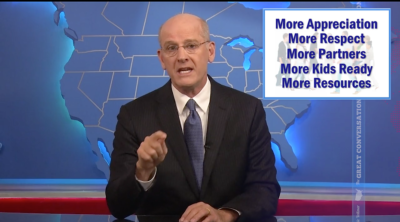Education advisor speaks to the community
BY MIKE KCKENNA

“Everyone benefits when communities support their local schools,” Jamie Vollmer said.
A noted author and popular public speaker, Vollmer is in the Wood River Valley this week to share his theory about education. On Thursday morning, March 5, Vollmer will speak at a special Breakfast with The Chamber at the Community Campus in Hailey. Like all Chamber events, it is free and everyone is welcome to attend.
“Something needs to change,” Vollmer said during a phone interview last week. “But anyone who thinks people are the problem should spend a day in a school. The problem is not the people.”
Vollmer began his life as an attorney and successful businessman. But his life changed direction when he was asked to be part of a roundtable for schools in Iowa several decades ago.
“I was a vocal critic of public education. I was convinced the system was broken and that if we ran it like a business, we could fix it,” he said. “The deeper I got involved, the more I realized my theories were wrong.”
As Vollmer dove deeper into education, he began to realize that the people—at least most of them in the system—weren’t the problem. He also realized that trying to run it like a business wouldn’t work, either.
Unlike a typical business, schools have no control over the raw materials they have to work with. For example, the average kindergarten class in America is open to everyone from kids who’ve been read to since they were in the womb to kids who have never been read to. Schools also can’t control their budget sources, as the whims of politicians and voters make those decisions. Lastly is that fact that no one can agree on what the final product of an education system should be.
Thankfully, Vollmer believes there are reasons to be hopeful.
“First thing we need to do is build a conversation. The number one rule for school transformation is that you cannot touch a school until you touch the culture of the community,” Vollmer said. “The community needs to help educators know what it needs.”
Besides re-thinking what we teach, Vollmer said we need to “re-think how we group students.” The one-style-fits-all model of public education simply does not work for many students, from low to high achievers and numerous kids in between.
“Now that the economy and world has changed, schools need to change, too. We need to create curriculums that make sense for the 21st century,” he said.
Vollmer’s final point is to remind every member of the community how important it is to have a quality local education system. He rolled off stats that equate better schools to improving everything from real estate values to lower law enforcement issues to stronger healthcare systems to better service sectors across the board.
“When schools do a better job,” Vollmer said, “the positive externalities increase across the community.”



